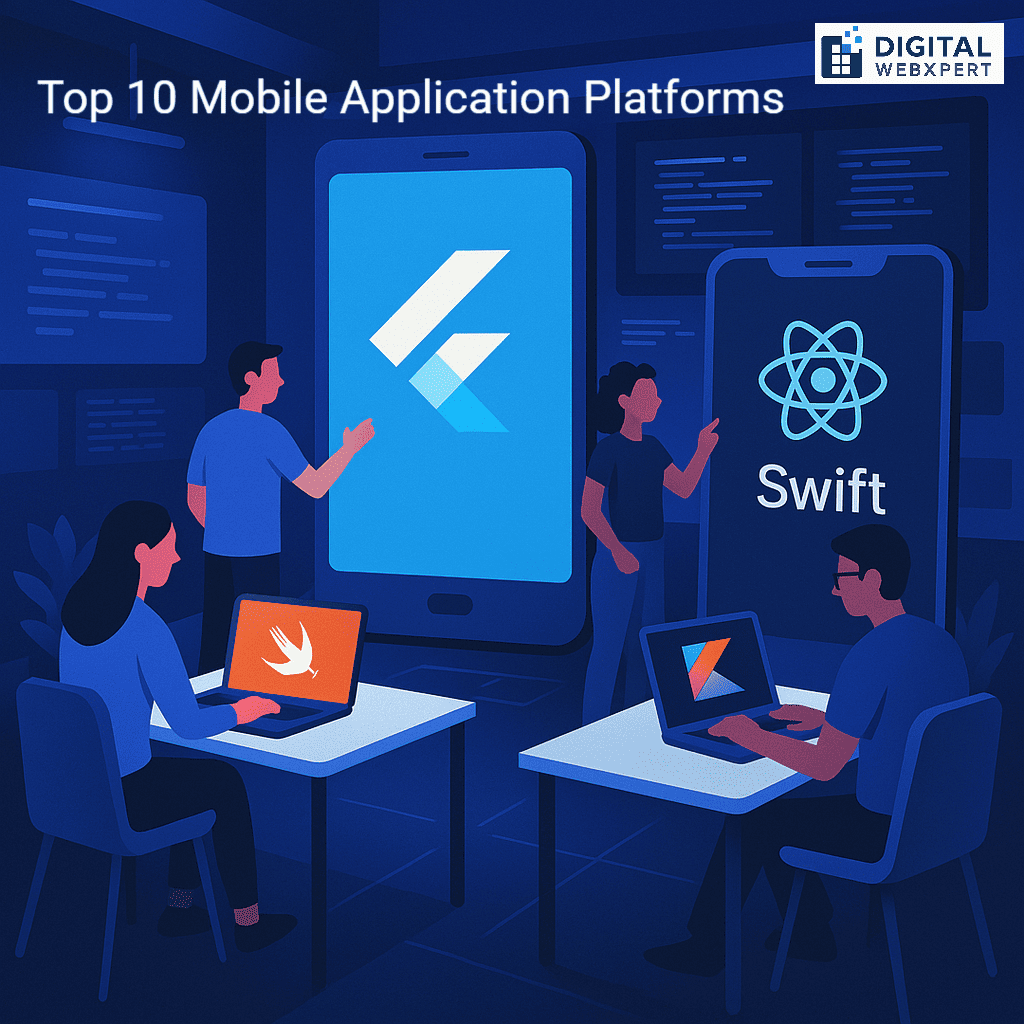In today’s digital-first world, launching a mobile app is no longer optional—it’s a business necessity. Whether you’re a startup, SaaS company, or enterprise, your app’s success largely depends on the mobile application platform you choose.
The right platform will streamline development, reduce time to market, ensure high performance, and provide cross-platform compatibility. In this guide, we’ll explore the top 10 mobile application platforms for 2025 to help you pick the best fit for your next big idea.
🏆 Top 10 Mobile Application Platforms in 2025
1. Flutter (By Google)
Best for: Cross-platform development with native performance
Key Features:
-
Single codebase for Android & iOS
-
Fast development with hot reload
-
Strong community and widget-rich UI
Why Choose Flutter?
Flutter is ideal for startups and businesses wanting fast, scalable mobile apps with near-native performance. Backed by Google, it’s one of the most trusted mobile application platforms in 2025.
2. React Native (By Meta)
Best for: JavaScript developers building cross-platform apps
Key Features:
-
Reusable components
-
Strong integration with third-party plugins
-
Large developer ecosystem
React Native vs Flutter?
React Native has better community support and native component access, while Flutter offers more performance and design control.
3. Swift (for iOS)
Best for: Native iOS app development
Key Features:
-
Fast, secure, and scalable
-
Built and supported by Apple
-
Better performance than hybrid apps
Use Swift if you want a high-performance, secure iOS app and full access to Apple APIs.
4. Kotlin (for Android)
Best for: Native Android app development
Key Features:
-
Official Android language
-
Fully interoperable with Java
-
Powerful, modern syntax
Kotlin is Google’s preferred language for Android app development and offers full access to Android SDKs.
5. Xamarin (by Microsoft)
Best for: Enterprise-level cross-platform development
Key Features:
-
Integration with .NET & Visual Studio
-
Code sharing across platforms
-
Performance close to native
Choose Xamarin if you’re a .NET developer building complex apps for multiple platforms.
6. Ionic
Best for: Hybrid app development with web technologies
Key Features:
-
HTML, CSS, JavaScript-based
-
Works with Angular, Vue, React
-
Easy integration with Firebase, Cordova
Use Ionic if you want to build PWA, Android, and iOS apps using web skills.
7. OutSystems (Low-Code Platform)
Best for: Enterprises with limited development resources
Key Features:
-
Drag-and-drop UI builder
-
Built-in integrations
-
Enterprise-level security & support
OutSystems is excellent for internal enterprise apps or MVPs that need to launch quickly.
8. Appgyver (No-Code Platform)
Best for: Non-developers and startups
Key Features:
-
100% visual builder
-
Integrates with REST APIs
-
Free for indie developers
Appgyver allows anyone—even without coding skills—to build fully functional mobile apps.
9. BuildFire
Best for: Small businesses and agencies
Key Features:
-
No-code app builder
-
Custom plugin support
-
Scalable for enterprise use
BuildFire offers a balance between ease of use and advanced features, making it ideal for digital agencies.
10. Apache Cordova (PhoneGap)
Best for: Lightweight hybrid apps
Key Features:
-
Uses standard web technologies
-
Access to native device features
-
Older but still functional
Cordova is losing popularity but remains a good choice for simple, low-budget app projects.
📊 Mobile Application Platform Comparison Table
| Platform | Type | Best For | Key Technologies |
|---|---|---|---|
| Flutter | Cross-platform | High-performance apps | Dart |
| React Native | Cross-platform | JavaScript-based teams | JavaScript, React |
| Swift | Native (iOS) | iOS-only apps | Swift |
| Kotlin | Native (Android) | Android apps | Kotlin |
| Xamarin | Cross-platform | Enterprise & .NET developers | C#, .NET |
| Ionic | Hybrid | Web-based teams | Angular, HTML/CSS/JS |
| OutSystems | Low-code | Enterprises | Drag-and-drop builder |
| Appgyver | No-code | Beginners, MVPs | Visual builder + APIs |
| BuildFire | No-code | SMBs, agencies | Plugin system |
| Cordova | Hybrid | Simple web-based apps | HTML/CSS/JS |
🌟 How to Choose the Right Mobile Application Platform
When selecting a mobile application platform, consider:
-
✅ App type: Native, hybrid, or cross-platform?
-
✅ Budget: Free, open-source, or enterprise-level tools?
-
✅ Team expertise: JavaScript, Dart, Swift, or no-code?
-
✅ Time to market: Do you need an MVP quickly?
-
✅ Long-term scalability: Can it grow with your business?
💡 Expert Tip: Use Cross-Platform for MVPs, Native for Scale
Start with Flutter or React Native for MVPs, and switch to Swift/Kotlin for long-term scaling and performance-intensive applications.
❓ Frequently Asked Questions (FAQs)
Q1: What is a mobile application platform?
A mobile application platform is a framework or toolkit used to develop apps for mobile devices. It helps developers build, deploy, and manage mobile apps efficiently.
Q2: Which mobile application platform is best for Android?
Kotlin is the best native option, while Flutter and React Native are top cross-platform choices for Android.
Q3: Can I build apps without coding?
Yes! Platforms like Appgyver and BuildFire let you create apps without writing code using drag-and-drop interfaces.
Q4: Which platform is best for cross-platform app development?
Flutter is currently the most powerful and popular choice for building apps that work on both Android and iOS.
Q5: Are low-code platforms secure?
Enterprise-grade low-code platforms like OutSystems offer robust security, including compliance with GDPR, ISO, and enterprise standards.
🧠 Final Thoughts
The right mobile application platform can accelerate development, reduce costs, and boost user satisfaction. Whether you’re building an MVP or scaling a global app, your platform choice will define your success.
Need help choosing or building your mobile app?
Let Digital WebXpert guide you with expert development services tailored to your goals.
📞 Get a free consultation today!

